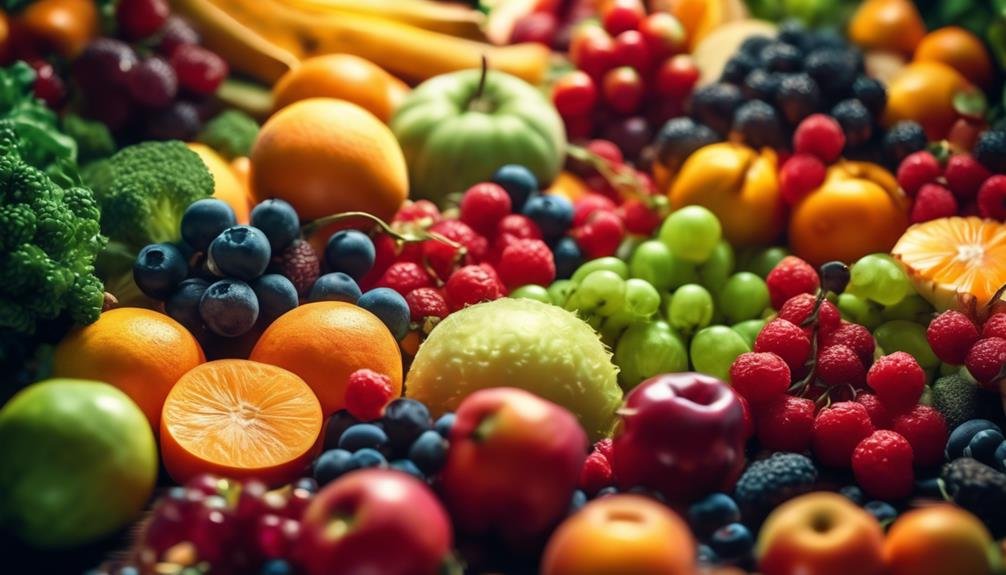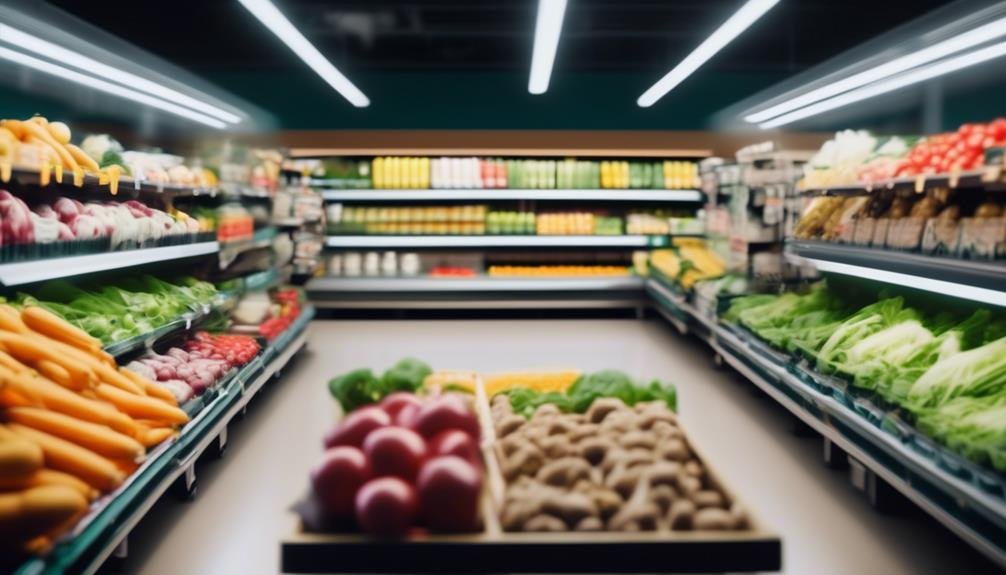Did you know that the global market for organic foods is expected to reach $679.8 billion by 2027? This staggering statistic reflects the growing interest and demand for organic products among consumers worldwide.
But what exactly sets organic foods apart from their conventional counterparts? Is it worth paying the higher price tag? In this discussion, we will explore the differences between organic and conventional foods, from the use of pesticides and chemicals to the impact on the environment and our health.
So, if you've ever wondered about the benefits of choosing organic, or if you're simply curious about making more informed decisions about the food you consume, then keep reading. You might just find some surprising insights along the way.
Key Takeaways
- Organic foods are grown without synthetic pesticides, making them a safer option.
- Organic farming practices prioritize soil health and nutrient content, enhancing the flavor of produce.
- Organic foods have lower levels of pesticide residues compared to conventional foods.
- Organic farming focuses on sustainable practices that promote soil health, conserve water, and protect biodiversity.
What Is the Difference?

When comparing organic and conventional foods, it's important to understand the key differences between the two.
One significant difference is the presence of pesticide residues. Conventional foods are typically grown using synthetic pesticides to protect crops from pests and diseases. These pesticides can leave residues on the food, which can be harmful to human health when consumed in large amounts.
On the other hand, organic foods are grown without the use of synthetic pesticides, making them a safer option for those concerned about pesticide exposure.
Another difference between organic and conventional foods is the taste. Many people claim that organic foods taste better than their conventional counterparts. This could be due to the fact that organic farming practices prioritize soil health and nutrient content, which can enhance the flavor of the produce.
Additionally, organic foods are often grown using traditional and sustainable methods, which can promote biodiversity and result in a more diverse and flavorful range of fruits and vegetables.
Pesticides and Chemicals Used
To further explore the topic of organic versus conventional foods, let's now examine the use of pesticides and chemicals in each.
When it comes to pesticide residue, organic foods generally have lower levels compared to conventional foods. This is because organic farming restricts the use of synthetic pesticides, relying instead on natural alternatives. By reducing exposure to pesticides, organic foods offer a potential benefit in terms of long-term effects on health.
Here are four key points to consider:
- Organic farming uses natural methods: Organic farmers utilize techniques like crop rotation, natural pest control, and composting to maintain soil fertility and prevent pests. This reduces the need for synthetic pesticides and chemicals.
- Conventional farming relies on synthetic chemicals: Conventional farmers often use synthetic pesticides and chemicals to control pests and increase crop yield. These chemicals can leave behind residues on the harvested produce.
- Pesticide residue in conventional foods: Studies have shown that conventional foods may contain pesticide residues, even after washing or cooking. Long-term exposure to these residues has been linked to health issues like hormone disruption and increased risk of certain cancers.
- Reduced pesticide exposure in organic foods: Organic foods are grown with minimal use of synthetic pesticides, resulting in lower pesticide residue levels. Choosing organic may help reduce your overall exposure to these potentially harmful chemicals.
Environmental Impact

The environmental impact of organic and conventional farming practices is an important consideration when comparing the two. Both organic and conventional farming methods have an impact on the environment, but the extent of this impact varies.
In terms of food production, conventional farming practices often prioritize high yields and use synthetic fertilizers and pesticides to achieve this. These chemicals can have negative effects on soil health, water quality, and biodiversity. On the other hand, organic farming focuses on sustainable farming practices that promote soil health, conserve water, and protect biodiversity. Organic farmers use natural fertilizers and pest control methods, which minimize the negative impact on the environment.
Sustainable farming is a key aspect of organic farming, as it aims to minimize the use of non-renewable resources and reduce pollution. By avoiding the use of synthetic chemicals, organic farming reduces the risk of pollution in soil and water, which can have long-term effects on ecosystems. Additionally, organic farming practices promote the use of cover crops and crop rotation, which help improve soil fertility and reduce erosion.
Nutritional Value Comparison
As we shift our focus to comparing the nutritional value, it's important to consider how organic and conventional farming practices may affect the quality of the food we consume. When it comes to nutritional value analysis, here are four key points to consider in the farming practices comparison:
- Pesticide Residue: Organic foods are grown without the use of synthetic pesticides, which can leave behind harmful residue. Studies have shown that organic fruits and vegetables have significantly lower pesticide levels compared to their conventional counterparts.
- Nutrient Content: Organic farming practices prioritize soil health, which can lead to higher nutrient content in organic foods. Research suggests that organic fruits and vegetables may contain higher levels of certain vitamins, minerals, and antioxidants.
- Antioxidant Activity: Organic crops are found to have higher levels of antioxidants, which play a crucial role in protecting our cells from damage caused by free radicals. These compounds have been linked to numerous health benefits, including reduced risk of chronic diseases.
- Omega-3 Fatty Acids: Organic animal products, such as meat and dairy, are often found to have higher levels of omega-3 fatty acids. These healthy fats are essential for brain health, heart health, and overall well-being.
When comparing the nutritional value of organic and conventional foods, it's clear that organic farming practices can have a positive impact on the quality and nutrient content of the food we consume.
Health Benefits of Organic Foods

Organic foods offer numerous health benefits that contribute to overall well-being. By choosing organic, you are not only nourishing your body with wholesome food, but also supporting sustainable farming practices that are beneficial for the environment.
Organic farming techniques prioritize the use of natural fertilizers like compost and manure, instead of synthetic chemicals. This means that organic produce is free from harmful pesticides, herbicides, and genetically modified organisms (GMOs). Studies have shown that organic foods tend to have higher nutritional value, including higher levels of vitamins, minerals, and antioxidants. These nutrients are essential for maintaining a healthy immune system, preventing chronic diseases, and promoting optimal growth and development.
But the benefits of organic foods go beyond just their nutritional content. They also help to protect the environment by reducing soil erosion, improving soil quality, and conserving water. Organic farming practices promote biodiversity by creating habitats for beneficial insects, birds, and other wildlife. Additionally, organic farming helps to lower greenhouse gas emissions and reduce reliance on fossil fuels.
In summary, choosing organic foods not only supports your own health, but also contributes to the well-being of the planet. By making this conscious choice, you are nourishing your body with nutrient-rich food while also promoting sustainable farming practices that benefit the environment. So go ahead and enjoy the many health benefits of organic foods!
| Health Benefits of Organic Foods | |
|---|---|
| Higher nutritional value | Promotes biodiversity |
| Free from harmful chemicals | Reduces soil erosion |
| Supports sustainable farming | Lowers greenhouse gas emissions |
Cost Comparison: Is Organic Worth the Price?
When considering the cost of organic foods, it's important to weigh the potential benefits against the price tag. While organic foods generally tend to be more expensive than their conventional counterparts, there are several factors to consider when deciding if organic is worth the price:
- Health benefits: Organic foods are grown without the use of synthetic pesticides, hormones, and antibiotics, which can have negative impacts on your health. By choosing organic, you're reducing your exposure to these substances and supporting a healthier lifestyle.
- Environmental impact: Organic farming practices prioritize sustainability and aim to minimize harm to the environment. By purchasing organic, you're supporting these practices and helping to protect our planet for future generations.
- Taste and quality: Many people believe that organic foods taste better and are of higher quality compared to conventionally grown produce. This is because organic farming methods focus on building healthy soils, which can enhance the flavor and nutritional content of the food.
- Supporting local farmers: Buying organic often means supporting local farmers who are passionate about sustainable agriculture. By purchasing their products, you're contributing to the growth of local economies and helping to create a more resilient food system.
While the price of organic foods may be higher, the potential benefits in terms of health, environment, taste, and supporting local farmers make it a worthwhile investment for many individuals. Ultimately, the decision comes down to personal values and priorities.
Organic Farming Methods

Considering the potential benefits of organic foods, it's important to explore the methods used in organic farming.
Organic farming techniques focus on sustainable agriculture, which aims to minimize environmental impact while maintaining soil fertility and promoting biodiversity.
One key aspect of organic farming is the avoidance of synthetic pesticides, herbicides, and fertilizers. Instead, organic farmers rely on natural methods to control pests and enhance soil health.
For example, they may use crop rotation, where different plants are grown in a sequence to break pest and disease cycles. Additionally, organic farmers may employ the use of beneficial insects, such as ladybugs, to control pests naturally.
To enrich the soil, organic farmers often use compost, manure, and cover crops to improve soil structure and nutrient content.
Genetically Modified Organisms (GMOs)
To understand the impact of genetically modified organisms (GMOs) on food production, it's crucial to examine their effects on crop yield and resistance to pests and diseases. Here are four important points to consider regarding GMOs:
- Increased Crop Yield: Genetically modified crops are often engineered to produce higher yields, which can help meet the growing demand for food. By inserting genes that enhance growth and productivity, GMOs have the potential to increase food production and alleviate hunger.
- Resistance to Pests and Diseases: GMOs can be designed to be resistant to specific pests and diseases. This reduces the need for chemical pesticides, resulting in lower costs for farmers and decreased environmental impact.
- GMO Labeling: One concern surrounding GMOs is the lack of mandatory labeling in many countries. Some argue that consumers have the right to know if their food contains genetically modified ingredients, allowing them to make informed choices about what they eat.
- Long-Term Effects: While GMOs have been extensively tested for safety, concerns remain about the potential long-term effects on human health and the environment. Further research is needed to fully understand the implications of GMOs on ecosystems and human well-being.
Understanding the impact of GMOs on crop yield, resistance to pests and diseases, GMO labeling, and long-term effects is essential in making informed decisions about the future of food production.
Food Safety Regulations

Food safety regulations play a crucial role in ensuring the quality and safety of the food we consume. These regulations are put in place to protect consumers from potential health hazards and to maintain the integrity of the food supply chain. They govern various aspects, such as food labeling, packaging, handling, storage, and transportation. By adhering to these regulations, food producers and distributors are required to meet certain standards to guarantee the safety of their products.
To better understand the importance of food safety regulations, let's take a look at a table comparing consumer perception of organic and conventional foods in terms of safety:
| Aspects | Organic Foods | Conventional Foods |
|---|---|---|
| Pesticide Residues | Low | High |
| Antibiotic Use | Limited | Frequent |
| GMOs | Prohibited | Allowed |
| Chemical Additives | Restricted | Common |
As shown in the table, organic foods are perceived to have lower pesticide residues, limited antibiotic use, and no GMOs, which aligns with consumer preferences for safer and healthier options. On the other hand, conventional foods often contain higher pesticide residues, frequent antibiotic use, and are allowed to include genetically modified organisms. However, it is important to note that both organic and conventional foods must comply with food safety regulations to ensure that they are safe for consumption.
Consumer Perception and Demand
Consumer perception and demand for organic and conventional foods is influenced by various factors such as health concerns, environmental sustainability, and personal beliefs. Understanding consumer awareness and market trends is crucial in analyzing the preferences of individuals when it comes to choosing between organic and conventional foods.
Here are four key points to consider:
- Health Concerns: Consumers are increasingly becoming more conscious about their health and are willing to pay a premium for organic foods due to the perception that they're healthier and free from harmful chemicals and pesticides.
- Environmental Sustainability: Growing awareness about the negative impact of conventional farming practices on the environment has led to a rise in demand for organic foods. Consumers are choosing organic options to support sustainable farming methods and reduce their carbon footprint.
- Personal Beliefs: Consumer demand is also influenced by personal beliefs and values. Some individuals may prefer organic foods due to ethical reasons, supporting small-scale farmers, or the desire for a closer connection to nature.
- Market Trends: The organic food market has experienced significant growth in recent years. This can be attributed to the increasing consumer demand for healthier and more sustainable food options. Market trends show that consumers are willing to pay a premium for organic products, indicating a strong demand for such foods.
Understanding consumer perception and demand is crucial for businesses in the food industry. By aligning their offerings with consumer preferences and market trends, companies can effectively cater to the growing demand for organic foods.
Supporting Local Agriculture

As consumer awareness and demand for organic and conventional foods continue to grow, one important aspect to consider is the support for local agriculture. By purchasing locally grown food, you not only contribute to the health of your community but also support the local economy. When you buy directly from local farmers, you help create job opportunities and stimulate economic growth within your community. This support for local agriculture has a ripple effect, benefiting not only the farmers but also other local businesses.
Engaging with local agriculture also fosters a sense of community. When you buy from local farmers, you establish a connection with the people who grow your food. You can visit farmers' markets, participate in community-supported agriculture programs, or even volunteer on local farms. These interactions create a sense of belonging and allow you to learn more about where your food comes from.
Moreover, supporting local agriculture promotes environmental sustainability. Local farmers often prioritize sustainable farming practices, such as minimizing pesticide use and implementing crop rotation techniques. By buying locally, you reduce the carbon footprint associated with long-distance transportation of food. Additionally, supporting local agriculture helps preserve farmland and open spaces, maintaining the beauty and character of your community.
Making Informed Decisions
When making decisions about the food you consume, it's essential to be well-informed and consider factors such as nutritional value, production methods, and sustainability practices. By making informed decisions, you can have a positive impact on your health and the environment.
Here are four key points to consider when making informed decisions about organic farming:
- Nutritional Value: Organic foods are often richer in essential nutrients such as vitamins, minerals, and antioxidants. Studies have shown that organic fruits and vegetables contain higher levels of beneficial compounds compared to their conventionally grown counterparts.
- Reduced Chemical Exposure: Organic farming practices prohibit the use of synthetic pesticides, herbicides, and genetically modified organisms (GMOs). By choosing organic, you can reduce your exposure to potentially harmful chemicals and support sustainable farming methods.
- Environmental Benefits: Organic farming promotes soil health, biodiversity, and water conservation. By supporting organic agriculture, you're contributing to the preservation of ecosystems, protecting pollinators, and reducing water pollution.
- Animal Welfare: Organic farming standards prioritize the well-being of animals, ensuring that they're raised in more humane conditions. By choosing organic animal products, you're supporting ethical farming practices.
Frequently Asked Questions
Are Organic Foods Always More Expensive Than Conventional Foods?
Organic foods can be more expensive than conventional foods due to factors like limited supply and higher production costs. However, it's important to note that organic foods are not necessarily genetically modified and may have higher nutritional value.
How Do Genetically Modified Organisms (Gmos) Affect the Nutritional Value of Foods?
GMOs can impact the nutritional value of foods. Studies have shown that genetically modified crops can have lower levels of certain nutrients. So, it's important to consider the effects of GMOs on the nutritional content of the food you consume.
What Are Some Food Safety Regulations That Specifically Apply to Organic Foods?
When it comes to food safety regulations, organic foods have specific rules to ensure their quality. These regulations focus on factors like pesticide use, genetically modified organisms, and the use of synthetic fertilizers.
How Does Consumer Perception and Demand Impact the Availability of Organic Foods?
When it comes to consumer behavior and market demand, organic foods have a significant impact. People's perception and desire for healthier, more sustainable options drive the availability and accessibility of organic foods in the market.
What Are the Benefits of Supporting Local Agriculture When It Comes to Organic Foods?
Supporting local agriculture has many benefits when it comes to organic foods. By buying locally, you can reduce the economic impact of transporting food long distances, support local farmers, and promote a more sustainable food system.
Conclusion
In conclusion, when comparing organic and conventional foods, it's clear that organic options offer numerous benefits.
From their reduced use of pesticides and chemicals to their positive impact on the environment, organic foods are a healthier and more sustainable choice.
Additionally, they often contain higher nutritional value and are subject to stricter safety regulations.
With growing consumer demand for organic products, supporting local agriculture and making informed decisions can lead to a happier and healthier lifestyle.




